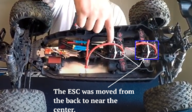Yankeedoodle30
RCTalk Talkaholic
A R/C YouTuber video suggested moving the Shredder's ESC closer to the motor for improved performance, which would shorten the cables by ~4 inches. Would this 4 inches of less resistance make a significant difference in the speed or response of the motor?


